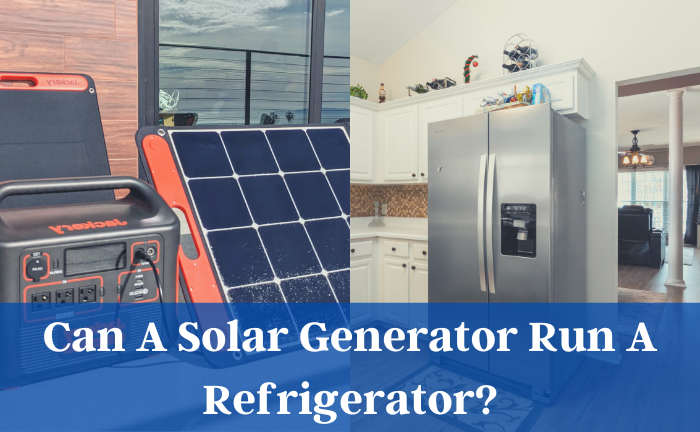Indeed, power outages come unexpectedly. If the power goes out for a long time, your refrigerator will be unable to maintain a particular temperature. As a result, your food might get spoiled. A solar generator is the first thing that popped up in my mind to deal with this situation.
Yes, you heard it right. A solar generator can run a refrigerator. Various people think that a refrigerator requires a lot of power to operate, it is true but not as much power as you think.
Let’s delve into and explore every crucial factor of solar generators to run a refrigerator. Here you go:
Table of Contents
Identifying The Size Solar Generator To Run A Refrigerator
Wherever you go to choose the size of solar generator to operate your fridge, there are a few basic things to consider. Let me introduce you to these crucial factors:
Running Wattage
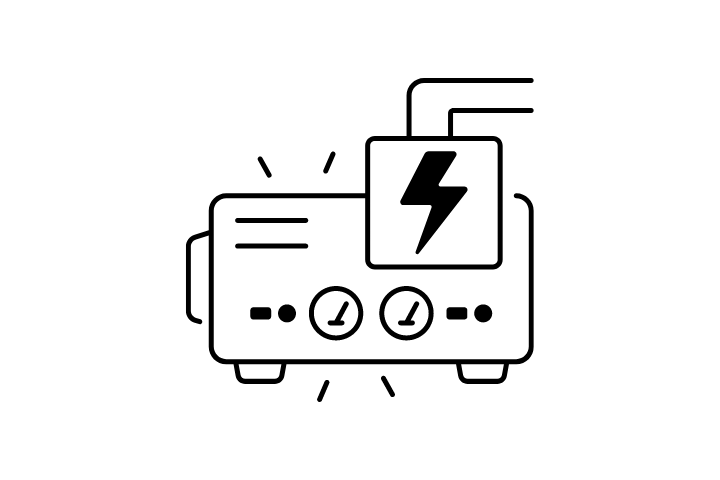
The running wattage of refrigerators varies according to their model. An average refrigerator requires 400W to 600W power to run. It illustrates that your solar generator must provide more than 600W energy to operate your refrigerator appropriately.
You can also identify the running wattage of your fridge by searching your model’s details online. Make sure your generator’s power is always 10% more than the required wattage.
Starting Wattage
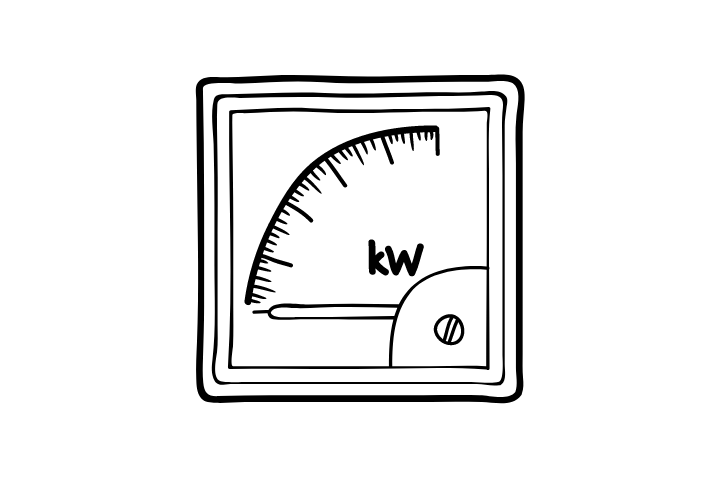
Starting Wattage is the energy required to start your refrigerator. It is the power needed for a short time with maximum intensity. A few devices like a well pump require a huge power supply to start.
Therefore, it is mandatory to compare the surge wattage of your refrigerator with the solar generator. Your solar generator must have the power to start the refrigerator without getting overloaded.
Generator Capacity
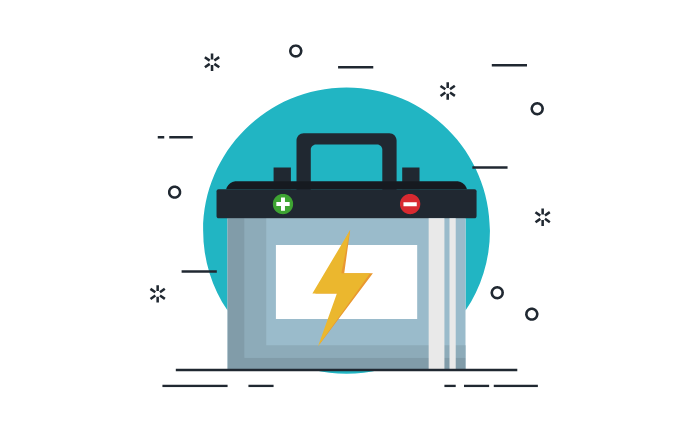
Another factor to keep an eye on is generator capacity. It is the capacity of a generator to store energy for later use. As you know, energy can be required in the absence of sunlight. So, you should always have a backup or stored power.
I’ll suggest you purchase a high efficiency power backup that can store maximum amount of energy to run your refrigerator during a power blackout.
Solar Panel Size
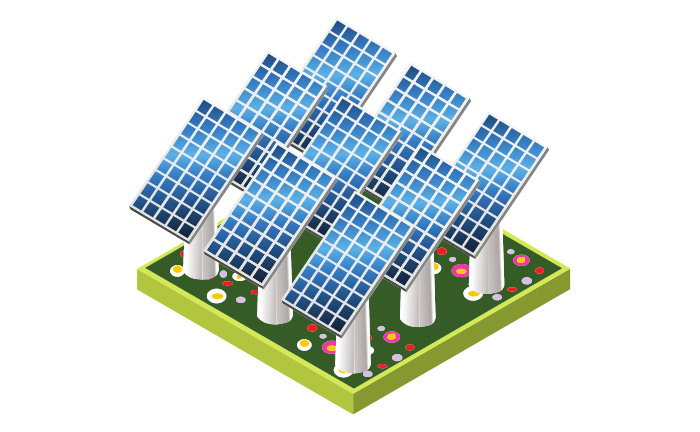
Solar panel size also plays a mandatory role in running a fridge with a solar generator. A large number of solar panels will generate more energy and enable your refrigerator to work effectively when there’s no electricity.
Meanwhile, if you have small sized solar panels, they will have low amounts of energy. Lack of energy will fail to run your refrigerator in any emergency condition.
How Many Solar Panels Are Required To Power Fridge?
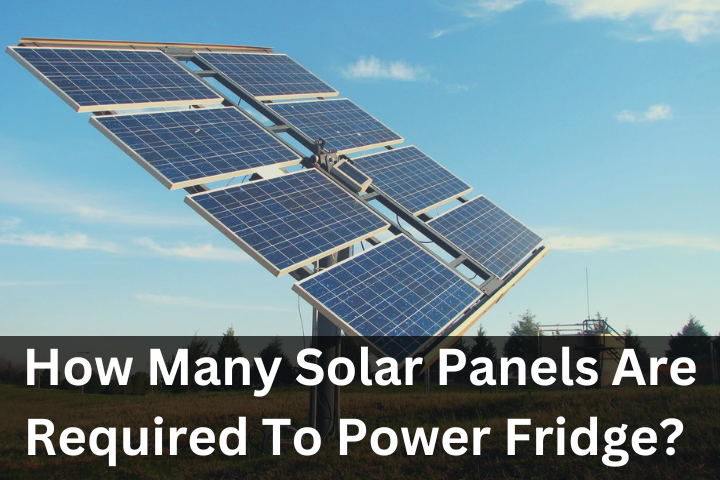
When it comes to solar panels, you must be thinking about how many solar panels would be enough to run your fridge smoothly. The number of solar panels relies on a few specific factors. These include.
- Amount of sunlight where you live.
- The power rating of solar panels.
- The capacity of solar generators.
- Power consumption of your refrigerator.
Indeed, solar panels do not operate independently to power your appliances. However, it plays a significant role in fetching enough power from the sun to make your solar generator capable of running a fridge.
The number of solar panels can be estimated by matching the wattage of a refrigerator with the power supply of solar panels to the battery.
Related: What Will A 1000-Watt Solar Generator Run?
How Many Watts Do I Need To Run a Refrigerator?
According to my research, you need 2000W per day to run a refrigerator with a solar generator. It means that your solar generator must provide you with 3000W – 4000W power. As you know, the running wattage and the starting wattage of refrigerators are different.
The wattage requirements also vary according to the type and size of refrigerators. You can estimate the required wattage by determining the running wattage and starting wattage of the model of your refrigerator.
You should also know that if you want to run a fridge and a freezer together, the watts requirements might be altered. Therefore, your solar generator must have enough capacity to deal with all kinds of ups and downs during a power outage.
Running & Starting Wattage Of Refrigerators
The running and starting wattage of a few refrigerators are given below.
| Refrigerator Type | Starting Wattage | Running Wattage |
| Mini Fridge | 200W | 50W |
| Mini Glass Refrigerator | 210W | 140W |
| Standard Mini Fridge | 300W | 75W |
| Count-Top Fridge | 240W | 160W |
| Small Energy Refrigerator | 528W | 32W |
| Big Size Mini fridge | 400W | 1100W |
| Side-by-side Refrigerator | 1188W | 792W |
| Small Size Fridge | 1200W | 400W |
| Refrigerator Showcase | 315W | 210W |
| Standard Size Fridge | 2900W | 700W |
| Big Energy Fridge | 1000W | 250W |
| Large Side-by-side refrigerator | 4000W | 1000W |
| Biggest Size Fridge | 6000W | 1500W |
FAQs
Now let’s discuss some common FAQs regarding the topic under discussion:
How Long Will A Solar Generator Power A Refrigerator?
The running time of a refrigerator varies according to its model and size. The size of the solar generator also plays a crucial role in it. A 1500W solar generator can run a normal refrigerator for approx 3 hours.
Likewise, a 2500W solar generator will increase the time to 4 hours and so on. The running time of the refrigerator can be reduced if your fridge requires more power than your generator’s capacity.
Can A Solar Generator Damage A Refrigerator?
A solar generator does not damage a refrigerator at all. You can connect your refrigerator to a solar generator without any safety concerns. However, if I talk about risks, there are only a few possibilities that can damage your fridge.
- Nowadays, refrigerators come with a microprocessor that can work only with an inverter generator. So, you should purchase an inverter generator to avoid damage.
- The wattage of your solar generator must be higher than the refrigerator needs. Otherwise, it will damage your refrigerator.
Bottom Line
In conclusion, I would like to say that a solar generator can run a refrigerator. All you have to do is identify the running and starting wattage of your refrigerator, and the power consumption of your fridge. These factors will help you to choose a suitable solar generator for your refrigerator.
You have also gone through a table illustrating the basic refrigerators’ wattages. If your refrigerator type is above in the writing, you don’t have to roam on other sites. Set up your refrigerator now with a solar generator.

